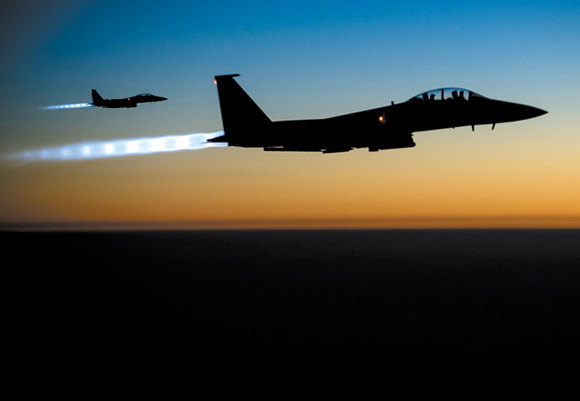Wonderful Cold War Days Of Yore

A pair of U.S. F-15E Strike Eagle flies over northern Iraq Sept. 23 after conducting airstrikes in Syria. U.S.-led coalition warplanes bombed oil installations and other facilities in territory controlled by Islamic State militants in eastern Syria Sept. 26, taking aim for a second consecutive day at a key source of financing that has swelled the extremist group’s coffers, activists said. AP Photo/U.S. Air Force, Matthew Bruch
Ah, how I yearn for the good old days. Remember when godless Commies threatened us from East, West, North, South: Russian Commies, Chinese Commies, Cuban Commies? Villainy marked their countenances: Joseph Stalin and his fistful of atomic weapons, Chairman Mao and his little red book, and Ho Chi Minh with his hordes of Viet Cong.
Today we’re warned of the villainy of Syria’s President Bashar Assad. He doesn’t look wicked. He looks like a dweeby, British-educated ophthalmologist. Which he is.
Appearances deceive, however. The lifeless bodies of thousands of his citizens testify to Assad’s villainy. More than two years ago, President Barack Obama accused Assad of committing “terrible atrocities” against his own people, called for his resignation and helped initiate removal of Assad’s stores of poison gas from Syria.
What Obama refused to do was provide arms to Syrians fighting to overthrow Assad. So he remains in
power, and Obama dismisses as “mythology” the notion that had the United States provided arms to his opponents, they would have succeeded in driving Assad from office.
One group opposing Assad has since morphed into something called ISIS or ISIL or just IS, a well-trained, well-funded radical Islamist army intent on more than deposing a president. They’re Sunni Muslims who’ve gobbled up land as far as the gates of Baghdad.
Obama, the peacemaker and presidential candidate, promised to end America’s wars in Afghanistan and Iraq, and he’s largely succeeded. But ISIL has him fashioning a coalition of Middle Eastern states, plus the United Kingdom, France and Belgium. He’s also launched American planes and missiles on IS targets in Iraq and Syria.
The deal, according to Obama, is that the Iraqis and unnamed others with aid of U.S. special forces will do the ground fighting. The United States will provide the air force.
A couple of Sundays ago, CBS News’s 60 Minutes aired reporter Steve Kroft’s interview with President Obama. At one point, Kroft acknowledged Obama’s skill in putting together the coalition, but asked why America seemed to be doing all the work.
“Steve, that’s always the case,” Obama replied. “Always the case. America leads. We are the indispensable nation.
“We have capacity no one else has. Our military is the best in the history of the world. When trouble comes up anywhere in the world, they don’t call Beijing. They don’t call Moscow. They call us. That’s the deal.”
Obama cited United States’ humanitarian response to a typhoon in the Philippines and an earthquake in Haiti. “That’s how we roll,” said Obama. “That’s what makes us America.”
Stirring words, those, but frightening as well.
“The best military in the history of the world?” How about Napoleon’s legions? Or Germany’s Wehrmacht? Or the Russian army that had that Wehrmacht running toward home before Russia’s allies could open a second front in Normandy?
Good militaries those, and probably touted by each of their commanders in chief — Napoleon, Hitler and Stalin — as the “best military in the history of the world.” At this moment, the United States military undoubtedly is “the best military” on earth. But that doesn’t mean we should use it whenever called.
And we are “the indispensable nation.” The hubris implicit in that statement could make an impatient America want “to roll” again, not with air power alone, into places like Vietnam, Cambodia, Kuwait, Afghanistan, Iraq, wherever. A half-century ago, Arkansas Sen. J. William Fulbright referred to it as “the arrogance of power” that led us into Vietnam.
Sometimes a ringing telephone should be left unanswered.
dbboylan70@gmail.com



